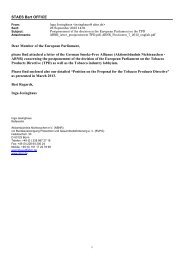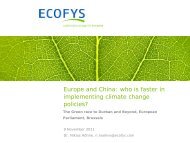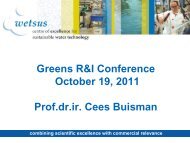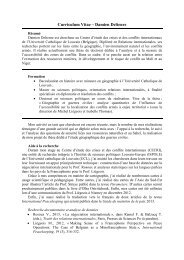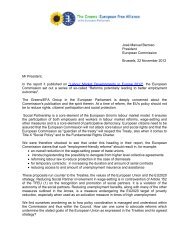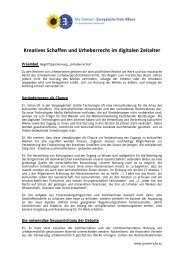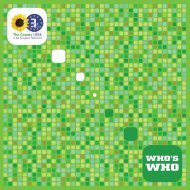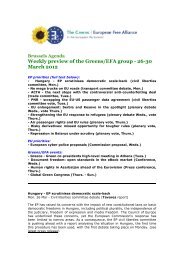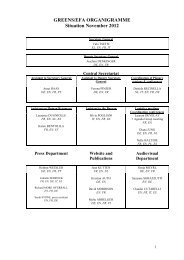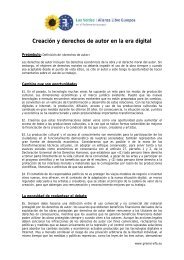Agro-Biotechnology: - The Greens | European Free Alliance
Agro-Biotechnology: - The Greens | European Free Alliance
Agro-Biotechnology: - The Greens | European Free Alliance
You also want an ePaper? Increase the reach of your titles
YUMPU automatically turns print PDFs into web optimized ePapers that Google loves.
22 | Cloned farm animals - a ‚killing application‘? | Food Safety<br />
3. Food safety<br />
In its opinion the FDA (2008) excludes any possible health risks:<br />
“Extensive evaluation of the available data has not identified any subtle hazards<br />
that might indicate food consumption risks in healthy clones of cattle,<br />
swine, or goats.”<br />
On reading the FDA report (2008), there seems to be a coherent approach to<br />
'downplay' both the effects observed in cloned animals and deviations in the<br />
composition of food such as milk. <strong>The</strong> FDA is basing its arguments on a small<br />
range of data that display many uncertainties and unexpected effects. <strong>The</strong><br />
FDA is not considering further investigations, but is thinking up explanations<br />
as to why certain findings are not relevant or why missing data are not a real<br />
problem. Rather vague data have been accepted to show that milk from cloned<br />
animals does not pose any risk:<br />
“In their Discussion, the authors point out that the discrepancies between the<br />
observed values and reference ranges may be explained by the small numbers<br />
of animals in their study, and that comparison of milk from clones to<br />
milk from a wider selection of control animals that represent more genotypes,<br />
nutrition and farming systems would put the values from clones within reference<br />
ranges for normal bovine milk. Thus from this pilot study, the authors<br />
conclude that the composition of milk from the nine clones was “broadly<br />
similar” to milk from the five comparator cows.”<br />
Where differences in the physiology of the animals are detected the FDA is<br />
dismissing these finding in regard of food safety:<br />
“Although there may be some physiological differences between clones and<br />
their comparators during the transition between the perinatal and juvenile<br />
developmental nodes, none of these differences indicate the presence of any<br />
subtle or frank food consumption hazards.”<br />
According to the Center for Food Safety (2007) there are nearly no peer reviewed<br />
studies available so far which deal with the safety of food products derived<br />
from cloned animals. <strong>The</strong> FDA has therefore based its conclusion on the safety<br />
of milk on only three studies that were available at that time. All three studies<br />
on milk showed some differences in comparison with samples from other cows.<br />
<strong>The</strong> German authorities for risk assessment seem to be more cautious saying<br />
that the FDA report fails to take more recent scientific methods such as metabolic<br />
profiling into account to assess equivalence in food products 24 .<br />
Furthermore, the EFSA does not question food safety (2008a, 2009). In its overall<br />
conclusion the EFSA (2008a) presented an opinion saying that there are no<br />
indications for specific risks attached to food derived from cloned animals:<br />
“(...) there is no indication that differences exist in terms of food safety between<br />
food products from healthy cattle and pig clones and their progeny,<br />
24 http://www.bfr.bund.de/cm/208/risikobewertung_der_food_and_drug_administration_zu_lebensmitteln_von_geklonten_tieren.pdf



